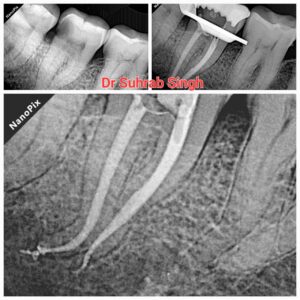
Dental Radiology in Noida
In Noida, dentistry has evolved in several ways in modern times. Dental radiology has also improved significantly due to the superior technology introduced in dentistry. Dental radiology at Neo Dental Care, a dental clinic in Noida now employs cutting-edge technology in the form of digital methods for taking radiographs.
Dental radiology and imaging devices use X-rays, radioactive substances, and other forms of radiant energy to diagnose and treat dental problems. The market is primarily driven by technological advancements in dental equipment, widespread digital dental radiology and imaging systems adoption, an aging population, and increased dental surgeries.
At Neo Dental Care, there are several dental imaging systems available. The dental radiology devices segment includes portable X-rays, equipment, phosphor storage plates, and other systems. Cameras and dental imaging software are some of the dental imaging devices.
The widespread use of radiology in dentistry and the availability of cost-effective technologies to treat dental problems are driving up demand for dental radiology in Noida.
Dental X-rays can detect problems in your mouth, gums, teeth, and jaw early on. Treating issues at the initial stage can save you money, pain, and, in some cases, your life.


The Department of Radiology at Neo Dental Care, one of the best dental clinics in Noida, is well-equipped to offer services such as CT, Ultrasound, X-Rays, Mammography, Digital Subtraction Angiography (DSA), and intervention procedures.
The department, which comprises highly skilled radiologists and technicians, is fully integrated with the hospital’s medical and surgical care. In addition, the department is actively involved in scientific research studies and clinical trials to improve patient treatment and care.
This article will cover dental radiology, different types of dental X-rays, risks, and more.
First, let’s know more about,
Dental X-rays
Dental X-rays are images of your teeth that your dentist uses to evaluate your oral health. They may appear complex, but they are common tools just as necessary as a dental cleaning.
The insides of your teeth and gums are photographed using low-power X-rays. This can assist your dentist in examining conditions such as dental cavities, tooth decay, and damaged teeth.

What is the Purpose of Dental X-rays?
X-rays can detect underlying issues that cannot be seen with the naked eye, such as impacted wisdom teeth, decay between teeth and under-old fillings, bone loss due to gum disease, cysts, abscesses in the jaw, etc.
Our standard of care for new patients is to take dental X-rays to get a clear picture of your dental health, particularly if you have no X-rays from your earlier dentist.
If dental X-rays are not taken, it is easy to overlook problems, especially if there are no complaints of pain or discomfort.
Early detection and treatment can help you avoid dental emergencies and costly procedures later.
Types of Dental X-rays
Neo Dental Care offers the best dental radiology in Noida. Each dental X-ray captures a slightly different view of your mouth. Some of the common intraoral X-rays are:
Bitewing
This technique entails biting down on a special piece of paper. It lets the dentist see how well your teeth’s crowns match up. This method is commonly used to detect cavities among teeth (interdental).
Occlusal
This X-ray is taken to examine how the upper and lower teeth match up when your jaw is closed. It can also diagnose anatomical changes on the palate or the floor of the mouth. This technology allows capturing all of your teeth in a single shot.
Panoramic
For this type of X-ray, the machine revolves around the head.
Your dentist may use this technique to examine your wisdom teeth, inspect jaw problems, or plan for implanted dental devices.
Periapical
This technique focuses on two complete teeth, from root to crown.
Extraoral X-rays may be used when your dentist suspects that there may be problems in areas other than the gums and teeth, such as the jaw.
A dental hygienist will guide each step of the X-ray procedure. They may leave the room briefly while the photographs are being taken.
You will be instructed to remain stationary while the photographs are taken. If spacers (film holders) are used, they will be moved and adjusted in your mouth to obtain the correct images.
How much is the Dental Radiology Cost in Noida?
- The best dental radiology in Noida can cost anywhere between INR 1000 to INR 5000. Dental X-rays should be viewed as a preventive measure rather than a treatment procedure for future oral disorders.
- The cost of dental radiology in Noida depends on various factors, including the type of X-ray required and your dental insurance coverage.
- Your dentist is the right person to advise you on the cost of your X-ray. Your dentist will determine the type and number of X-rays necessary.
- Most dental insurance plans will cover the expenses of your X-rays to some extent. If you do not have health coverage, talk to your dentist about a payment plan.
Risks Associated with Dental X-rays
- Dental X-rays possess radiation, but the doses are so low that they are considered safe for kids and adults. If the dentist uses digital X-rays rather than film, your radiation exposure risks are reduced further.
- The dentist will also put a lead “bib” over the chest, stomach, and pelvic area to protect your vital organs from unnecessary radiation exposure. In the case of thyroid conditions, a thyroid collar may be used. Children and women of reproductive age may wear them in addition to the lead bib.
- The exception to the rule is pregnancy. Women who are pregnant or suspect they are pregnant should avoid all X-rays. Notify your dentist if you suspect you are pregnant, as radiation is considered unsafe for developing a fetus.
Regular dental X-rays are essential for maintaining overall oral health, like flossing and brushing. A good check-up can be reassuring, but that doesn’t mean you should stop getting X-rays.
Depending on your age, general wellbeing, and medical insurance, you may need X-rays every one to two years. Maintain your consultations and visit your dentist as soon as you notice any pain or changes in your mout
Frequently Asked Questions
Can dental X-rays reveal nerve damage?
X-rays can also be used to diagnose dead dental nerves. Although X-rays cannot provide a picture of soft tissue, a dead dental nerve can be seen on an X-ray film if it has caused some damage to the bone encompassing the root’s apex or tip.
Can a dental X-ray reveal a tooth infection?
An abscess at the tooth root is generally sensitive to touch or pressure. Dental experts recommend getting an X-ray. An X-ray of the aching tooth can aid in diagnosing an abscess. Your dentist may also use X-rays to determine whether the infection has spread and caused abscesses in other areas.
Are dental X-rays safe?
Yes, dental X-rays are safe and, in many cases, extremely beneficial to your oral health. The amount of radiation to which you are exposed is negligible.
How many times should teeth be X-rayed?
Your medical and dental history, as well as your present condition, determine the required X-ray frequency. For some people, X-rays may be necessary every six months. Others who visit the dentist regularly and do not have recent dental or gum disease may only require X-rays every two years.
Can dental X-rays reveal nerve damage?
X-rays can also be used to diagnose dead dental nerves. Although X-rays cannot provide a picture of soft tissue, a dead dental nerve can be seen on an X-ray film if it has caused some damage to the bone encompassing the root’s apex or tip.
Can a dental X-ray reveal a tooth infection?
An abscess at the tooth root is generally sensitive to touch or pressure. Dental experts recommend getting an X-ray. An X-ray of the aching tooth can aid in diagnosing an abscess. Your dentist may also use X-rays to determine whether the infection has spread and caused abscesses in other areas.
Are dental X-rays safe?
Yes, dental X-rays are safe and, in many cases, extremely beneficial to your oral health. The amount of radiation to which you are exposed is negligible.
How many times should teeth be X-rayed?
Your medical and dental history, as well as your present condition, determine the required X-ray frequency. For some people, X-rays may be necessary every six months. Others who visit the dentist regularly and do not have recent dental or gum disease may only require X-rays every two years.
